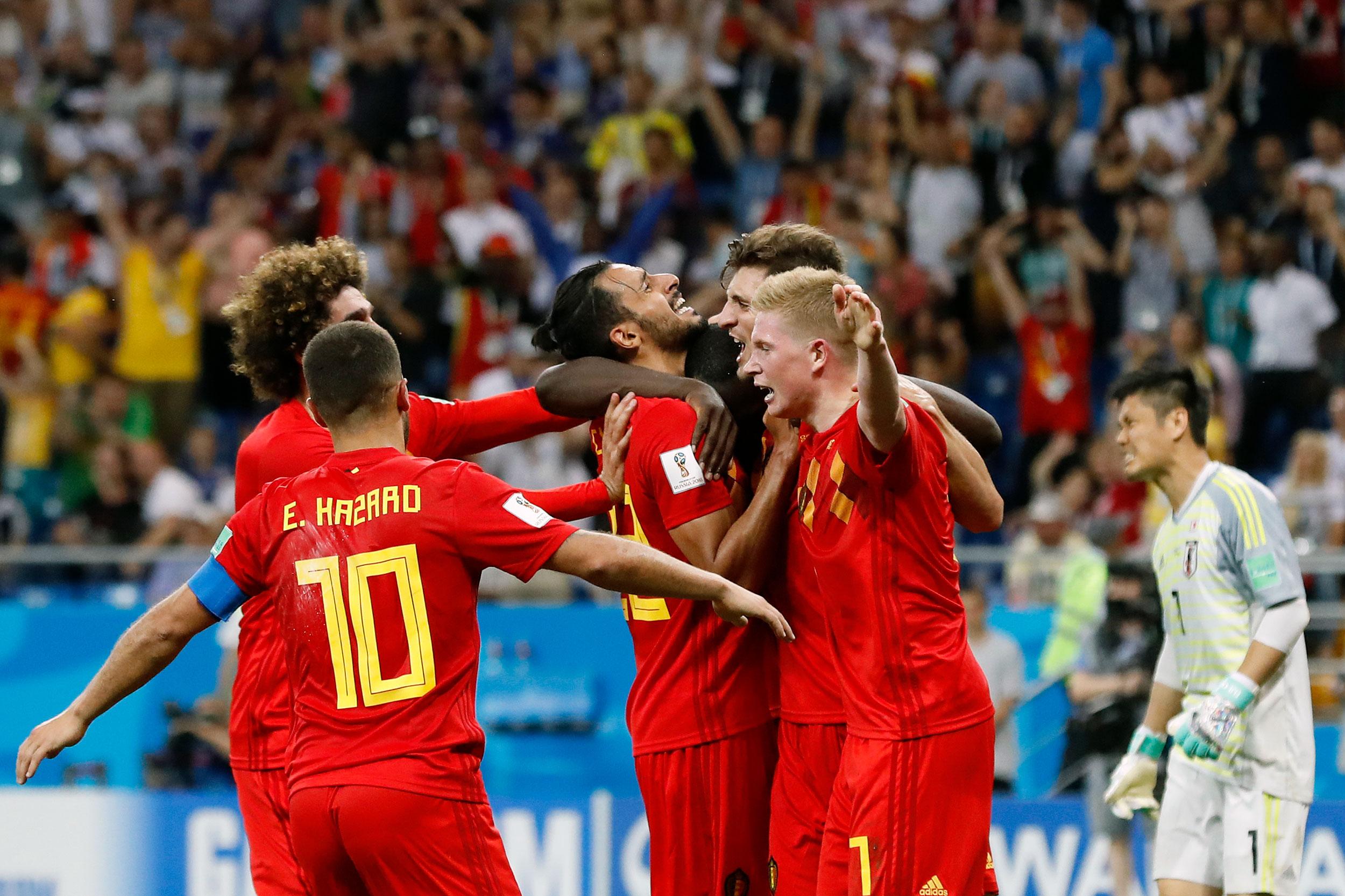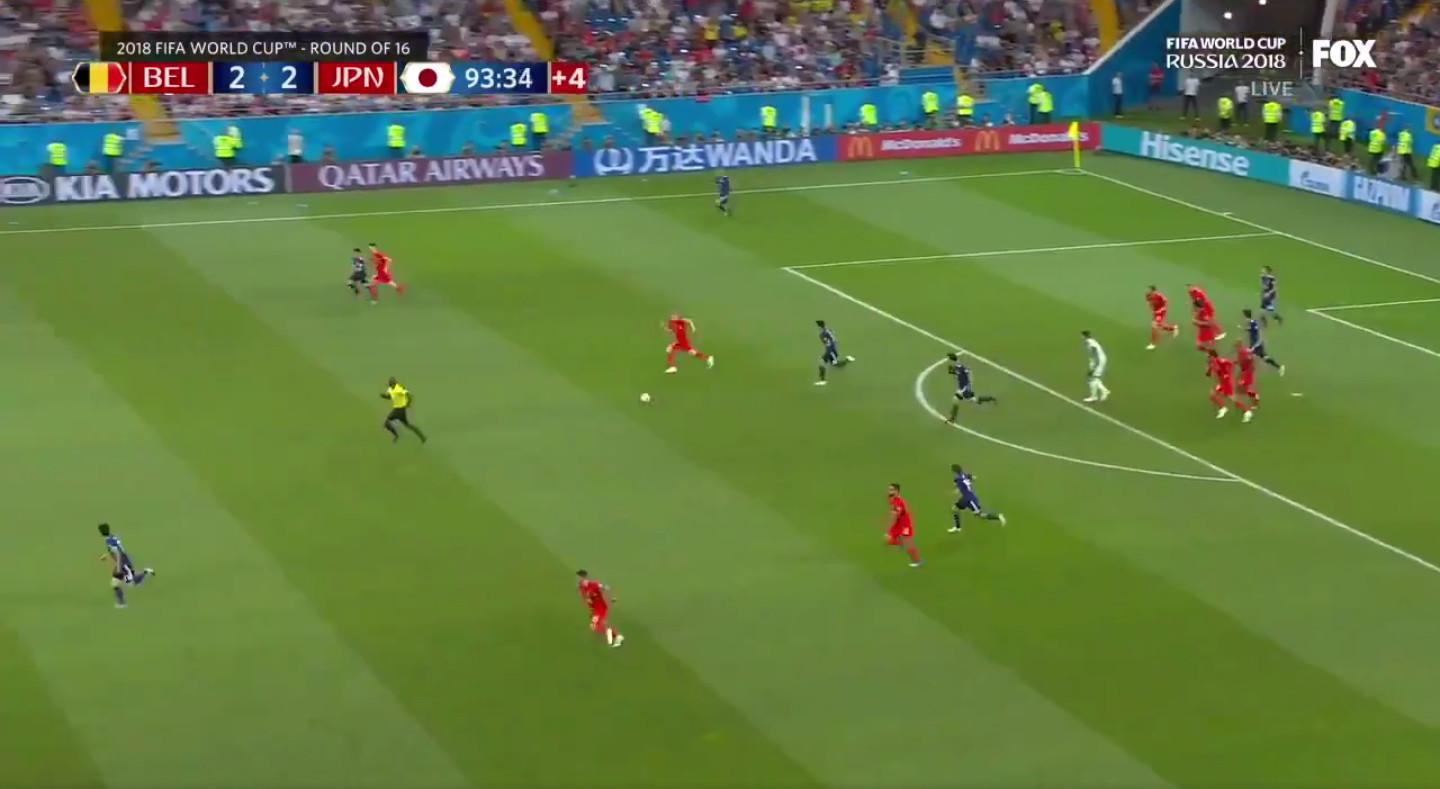
“The goal is soccer’s orgasm,” the late literary wizard Eduardo Galeano wrote at the start of the chapter titled “The Goal” in his seminal work, Soccer in Sun and Shadow.
“The goal, even if it be a little one, is always a goooooooooooooooooooooal in the throat of the commentators, a ‘do’ sung from the chest that would leave Caruso forever mute and the crowd goes nuts and the stadium forgets that it is made of concrete and breaks free of the earth and flies through the air.”
Those words are true of every goal—the ugly ones and the pretty—but were perhaps never more honest than after witnessing Nacer Chadli’s last-minute stunner to complete Belgium’s 3-2 comeback win over Japan on Monday.
Despite dominating the majority of the match, the Red Devils found themselves facing a two-goal deficit, and time was acting against them. The Japanese goals were each stunning in their own rights. Genki Haraguchi caught the end of a through ball and threaded it past a diving Thibaut Courtois in the 48th minute. Four minutes later, Takashi Inui found a window in a sea of Belgian defenders and unleashed a shot that touched the back of the net before a diving Courtois hit the ground.
As surprising as the upset would have been, the manner in which Japan so thoroughly dissected their foes was not. Belgium are one of the most complete attacking units in the world, and when things are clicking, they can produce dizzying displays of goal scoring. But more often than not, the combination of their personnel and a managerial insistence on treating defense as a second-rate study leaves them vulnerable. Japan’s first goal—the result of lackadaisical wing defending—was a typical concession for a team with no top-level fullbacks and an insistence of playing forwards as wing-backs. The second was the kind that normally punctuates the moment David steps on Goliath’s neck. Courtois is, by most metrics, one of the best keepers in the sport. And he had no chance of putting a hand on Inui’s rocket.
Belgium began to press harder, pushing and probing and looking for a goal to pull them within one. Eden Hazard nearly leveled the game before Inui’s goal, taking a volley off a bouncing ball in the box, but his strike smacked the right post. After the second Japanese goal, Romelu Lukaku almost found the back of the net, but he couldn’t finish Thomas Meunier’s cross within 6 yards. Throw in a few dramatic saves by Japanese keeper Eiji Kawashima, and some then-questionable Belgian substitutions that saw Yannick Carrasco and Dries Mertens come off for Nacer Chadli and Marouane Fellaini, and it seemed like there was a chance Japan might see out their upset.
But Belgium’s attack proved too mighty. First came an accidental feat of geometric beauty from Jan Vertonghen, who launched a fluttering airball toward the back post for a teammate to put into the net. Only he didn’t need any help getting it there. It dropped down from the heavens—a headed Olympico of sorts—leaving all 22 men standing on the pitch with nothing to do but watch as it slipped under the bar and into the goal.
Then it was Fellaini, who caught the end of a spinning Hazard cross and did what he does best, using his fur to smack the ball down and away from a diving Kawashima. Twenty-two minutes after Japan took what momentarily felt like an insurmountable 2-0 lead, they found themselves tied, on the back heel, and desperately hoping for extra time.
They would have no such luck. In the fourth and final minute of stoppage time, Courtois pulled in a curling Keisuke Honda corner kick and immediately started sprinting toward the edge of his box. He began directing traffic, and the break was on. Kevin De Bruyne collected his pass with enough open turf ahead of him to dock an aircraft carrier—never something an opponent wants to concede to the most dynamic creator in Europe.

By the time De Bruyne was ready to lay the ball off, the Japanese defense had begun closing in on the attacking midfielder, but Meunier and Hazard ran unmarked on the wings, and Lukaku continued to draw the attention of the central defenders up the heart of the pitch. De Bruyne directed the ball to Meunier, who caught it on the right edge of the box, and one-timed a pass to Lukaku. His goal would be the cap to a storybook tale. Who else would take the shot but the man with 101 Premier League goals; the man who, four years ago, scored the game-winning goal that put the Red Devils past the United States in the round of 16, and who, on Monday, came so close to repeating that performance? That was surely what ran through the mind of Kawashima, who was helpless as Lukaku unveiled his greatest trick, calmly stepping over the ball and allowing a trailing Chadli to slot the winner over the line. Belgium, 3; Japan, 2.
No camera angle exists—no SkyCam, nor tracking camera, nor grainy iPhone footage—that shows Belgium’s final goal for anything less than it is: a masterpiece. While De Bruyne darted up the pitch, Lukaku weaved across it, picking up Japanese defenders as he went, pulling them away from his teammates to create space. He didn’t touch the ball once, but no player had more of an impact on where it came to rest. His final act—a dummy that left fans screaming “WHY!” as the bicolored ball sputtered underneath his feet—became a show of brilliance milliseconds later when his countryman cooly guided it into the net.
Too often, we dissect moments in the World Cup and remark on how they could be improved: How the refereeing was inconsistent, or the defending was sloppy, the hesitation before a shot was cowardly, or the choice to leave a star defensive midfielder at home was misguided. I am guilty of it, as are most pundits, and writers, and fans alike. Chadli’s goal on Monday wasn’t vulnerable to those criticisms. It was a moment of pure euphoria. Or, as Galeano would put it, soccer’s orgasm.
